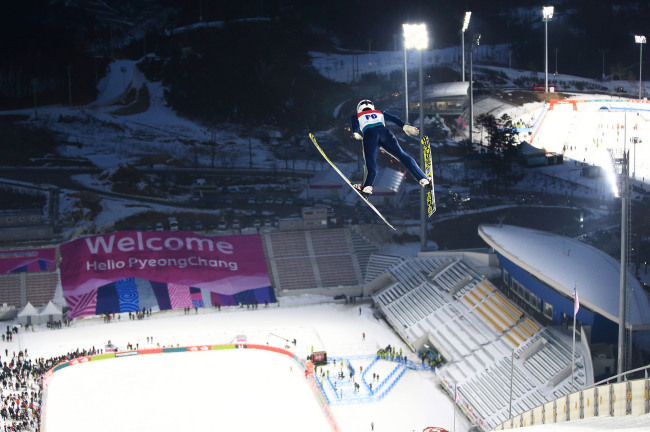For South Korea, 2017 was full of upheavals, including the ouster and imprisonment of a scandal-ridden former president and the dramatic rise of a new progressive government.
The real challenges, however, seem to lie ahead in 2018 as the nation faces a number of events that will test the capacity of the administration and the people.
The most imminent is the PyeongChang Winter Olympic Games to run from Feb. 9-25 in eastern Gangwon Province.
The international sports event, which would have marked the end of Park Geun-hye’s presidential term if not for the impeachment, has now ironically become a landmark legacy for the succeeding Moon Jae-in administration.
With just over a month until the opening ceremony, the occasion seems to be on the right track.
While the ticket sales rate surpassed the 60 percent mark on Dec. 24, corporate donations reached 1.5 trillion won ($1.4 billion) as of Dec. 28, overrunning its target 940 million won.
The real game, however, is not about these superficial figures.
Questions linger on whether PyeongChang will successfully act as an international forum of harmony and reconciliation – in line with the Olympic spirit.
At the core of it is North Korea, which, amid persisting tension over its nuclear and missile provocations, and whether it would participate.
Indicating a softening posture toward the South — but still making a strong warning that its status as a nuclear power was a “reality” — North Korean leader Kim Jong-un said Monday his country was willing to send its delegation to the games. Kim said Pyongyang hopes the PyeongChang Olympics are a success, adding, “We have readiness to take various steps, including the dispatch of the delegation.”
Taking strenuous measures to ensure successful games, the Seoul government has proposed delaying routine joint military exercises with the US in the coming months, a move it explains could help encourage North Korea to avoid provocation and inch closer to dialogue.
Japanese Prime Minister Shinzo Abe, meanwhile, has been reported as reconsidering his visit to PyeongChang, in the wake of the two countries’ dispute over the wartime sex slavery settlement.
Next in line is the June 13 local elections, which is to be the first major political event for the Moon government.
For the ruling liberals, the upcoming elections may be a chance to expand into the conventional conservative stronghold regions on the back of the new administration. For the conservative opposition, on the other hand, the match is an opportunity to turn the political tide before the next parliamentary and presidential elections.
A key point of interest is the election for Seoul mayor, a position often considered a litmus test for political power groups in the metropolitan region. While incumbent Mayor Park Won-soon is hinting at a third term, conservative opposition parties are struggling to win back the capital, so far with little success.
Another crucial issue weighing down on the nation this year is the national security agenda, which mostly pivots upon North Korea.
Though assessments vary, it is generally accepted that North Korea’s nuclear weapon and intercontinental ballistic missiles programs are nearing completion. Once its weapons programs are complete, Pyongyang will cross the “red line” President Moon Jae-in set down in dealing with the regime.
As the international community, including its allies China and Russia, will not recognize the North as a nuclear armed state, Seoul and Washington will be left with very few options in handling security issues on the peninsula once the line is crossed.
On the diplomatic side, Korea and China still remain far apart on issues regarding the THAAD deployment, in spite of the thawing effect of President Moon‘s state visit to China in December.
Disputes are also continuing with Tokyo as the two countries stood at odds over a controversial 2015 agreement on the wartime sex slaves.
While dealing with the social and political challenges, South Korea is also exerting all efforts to boost its long-stalled economy in 2018.
The Ministry of Strategy and Finance, along with the Bank of Korea, suggested a 3 percent growth rate and a per capita gross national income of $30,000 or more in 2018, citing global economic recovery and strong exports.
Asia’s fourth-largest economy, however, is also pressed to expand its business horizon due to its heavy reliance on the forte semiconductor business.


